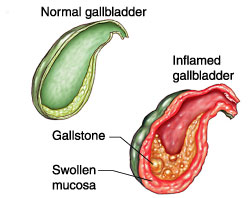Acute Cholecystitis
 Cholecystitis is an inflammation of the gallbladder, which is a common complication of cholelithiasis (formation of gallstones within the gallbladder). The gallbladder becomes inflamed when gallstones obstruct the cystic duct, causing an accumulation of the bile. The increasing pressure and concentration of the bile within the gallbladder causes its inflammation and swelling, which in turn reduces the normal blood flow in the area, possibly causing necrosis.
Cholecystitis is an inflammation of the gallbladder, which is a common complication of cholelithiasis (formation of gallstones within the gallbladder). The gallbladder becomes inflamed when gallstones obstruct the cystic duct, causing an accumulation of the bile. The increasing pressure and concentration of the bile within the gallbladder causes its inflammation and swelling, which in turn reduces the normal blood flow in the area, possibly causing necrosis.
Not every person who has gallstones will develop cholecystitis. Major risk factors include older age, pregnancy, female sex (females are two times more likely to develop cholecystitis), rapid weight loss, obesity, and Mexican or Native American ethnicity.
If the cholecystitis doesn’t have any complications, it has a great prognosis. However, 25 % of the people develop complications and may require surgery. It is also very important to diagnose acute cholecystitis on time, as it can lead to the death of the patient.
There are two main types of cholecystitis:
- Acute cholecystitis
- Chronic cholecystitis
Acute cholecystitis is characterized by severe pain in the abdominal region that happens as a result of sudden inflammation of the gallbladder.
